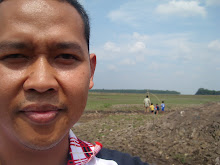Political atmosphere is often so seductive that many good and bad people try to win elections. Current examples are the elections in Bekasi, Tangerang, Jawa Barat, Indonesia, and even in the US. The candidates’ campaigns are often begun long before the elections. Money talks. Perhaps, some people start to get bored with the hectic. Some others are increasing in spirits, because of their ideal dream to make a difference or the business they get from the campaigns. Whether the votes will be given based on the ideals or business opportunities is an interesting question for me.
Parallel with democracy, markets have similar characteristics. The buyers and the sellers collectively decide which product will prevail at an agreed price level, without deliberate pre-coordination and cooperation. Google, Wikipedia, Linux, and Open Source are among phenomenons that demonstrate the success of bottom-up mechanism. The success should be underlined since those examples probably have pretty much more complex transactions than financial market transactions. So… it is OK I think to acknowledge the benefits of market mechanism and democracy for humanity.
James Surowiecki in his book The Wisdom of Crowds writes that a group is consistently smarter than the smartest person in the group. It is the case especially if the group is large in size and has decentralized, independent members. Surowiecki’s thesis is really in favor of democracy and free market ideology. If we relate it to Kota Bekasi’s mayor election, we can say that the people of Bekasi that consists of nationalists, religious, educated, uneducated, lost, and so on will be wiser in selecting the mayor than any highly educated person is. This means also that a PhD’s vote is no more valuable than (sorry) a thief’s vote.
In my opinion, democracy needs to be tested in a long period of time. The virtue of the wisdom of crowds can be easily perceived in a market. In financial markets, though, the wisdom of crowds often result in bubble and burst fallacy. It is unfortunate if someone chose only the wisdom of crowds as a decision-making mechanism. Although not extreme, Surowiecki tends to value the wisdom of crowds a bit excessively while saying most CEO’s give little value if not any to the companies employing them.
Finally, continuing the argument that market mechanism or democracy is not the one and only alternative, I would like to bring a simple example. Let us say that we face a difficult math problem. I think it is not wise to consult the wisdom of crowds since the crowds for sure have math savvy and math dumb and dumber. To ask the answer to the crowds will only lead us astray. OK, probably you would argue that real life problems are far from similar to math problems, but in real life too, we often need an institution, a person at the top, to take final decisions and execute them.
Since CEO’s, mayors, governors, managers, presidents, or any people-chosen leaders are the persons at the top who have most power to make a difference, they will be asked about their leadership and they have to be responsible. They cannot run away from accountability forever. If deliberately manipulating people, they will be punished. If not now, later off course.
Thursday, February 7, 2008
Democracy
Subscribe to:
Post Comments (Atom)

No comments:
Post a Comment